Independent journalism with solidarity-based subscription model
ARGIA is a news media funded in 1919 in Pamplona and published in Basque language. At first religious – called Zeruko Argia, "light of heaven” –, forbidden during the fascist dictatorship in Spain from 1936 on, in the 1950s and 1960s it had managed to come back, avoid censorship and little by little become a journalistic project. In 1980 some workers bought the media from its religious owners, took out the "Zeruko” ("of heaven“) from the name forming the worker-owned media ARGIA (meaning "light”). In the last decade, its journalistic focus has been placed especially in social problematics and culture, and the number of readers and subscribers has increased year after year, making ARGIA the most important weekly Basque magazine. Nowadays it is based near San Sebastian and 26 people work full-time.

aurre egingo dieten hedabide independenteak
Today ARGIA is a project with more than 60.000 readers every week in paper according to latest CIES inform. Between 7.000 and 12.000 people check this website every day. The main sections on the webpage are: politics, feminism, international, economics, culture, education, society, Basque language, history, environment and opinion. Publications include a weekly magazine (ARGIA), a monthly magazine (Larrun), a broadsheet format magazine published seasonally (Bizi Baratzea Orria), a yearbook (Gakoak) and the webpage which is actualized every day with around 20-25 news articles.
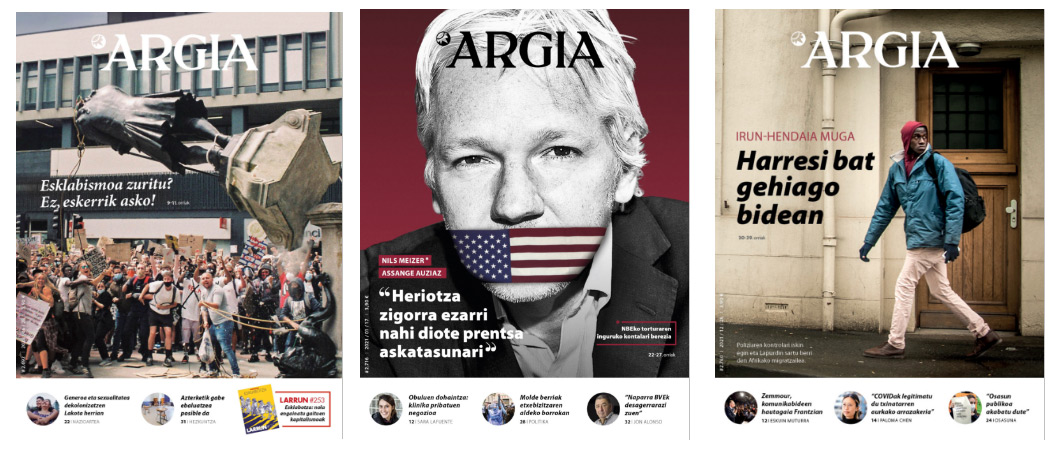
How are we organized? Who is the owner?
ARGIA is part of a four company group created around the magazine which support each other. Ametzagaiña group (124 workers) is formed by ARGIA, by the printery Antza (25 workers), by the informatics company Adur (60 workers) and by the web design and communication company Iametza (13 workers).
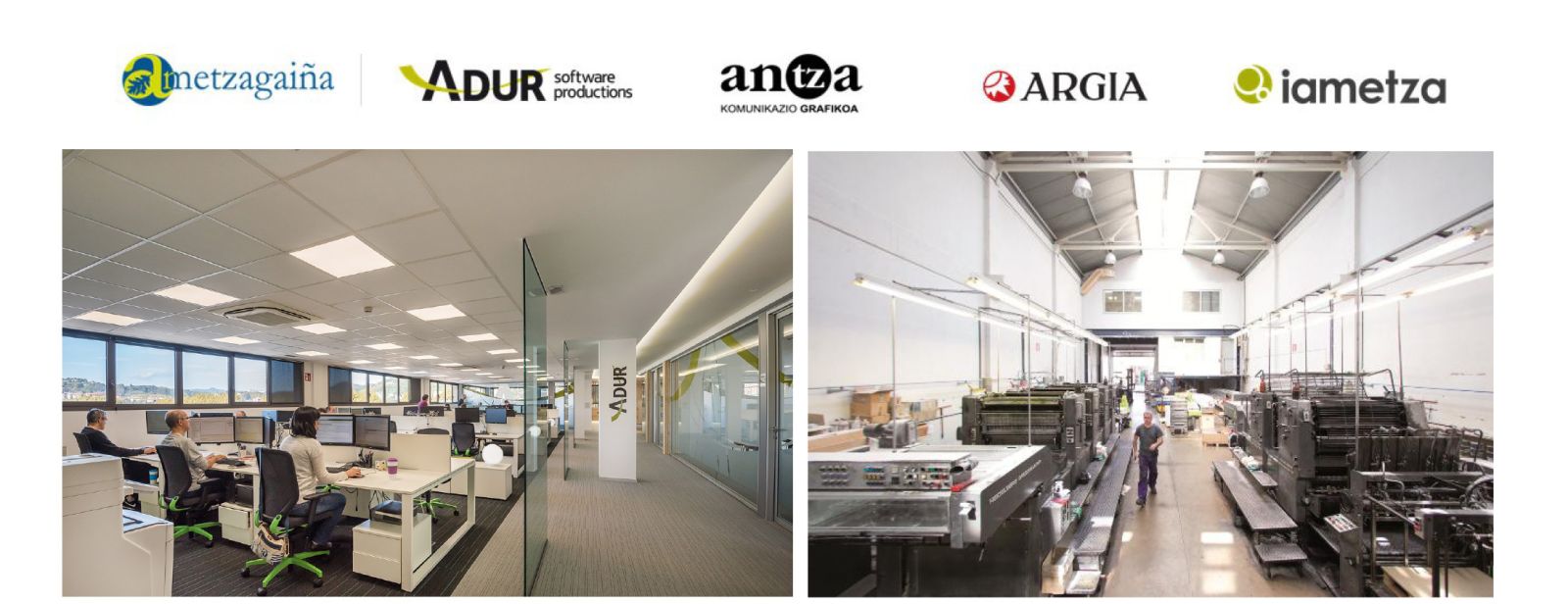
In 2022, ARGIA had a 1.4 million euros budget. Earning money is not the main aim of the project, but to inform, as best and as much as possible to the biggest audience. When there is an economic profit at the end of the year, it is either used to invest in the project, to improve workers' wages and working conditions, or to keep reserves to deal with future crises. The working-place pavilion is ARGIA’s property, which was bought 20 year ago and recently fully paid-off.
ARGIA is a cooperative in order to give space to the workers: space to decide, space to manage, space to learn how to manage such a project. Important decisions are taken by the workers, with the philosophy one person, one vote. ARGIA is an inter-generational project. Today the youngest worker is 20 and the eldest 63, and it is the same with the collaborators writing regularly in ARGIA.
Every new generation in ARGIA is taught how important it is to keep up the economic independence of the project: Without economic independence, there is no independent journalism. Nowadays 23 workers out of 26 are owners of ARGIA and every worker is offered to buy their participation in the company after having worked in ARGIA for two years. ARGIA has often been close to being shut down, but it is still publishing and reaching thousands of people with its information, after 103 years since it was first published. Nowadays the project is stabilized and workers assert they would never accept to leave this project on someone else’s hands, like a corporation or a bank, even if their salaries were doubled.
ARGIA is organized in three main sections (journalism, advertisements and administration) and every worker is in one of these sections. At the same time, the team is organized in work groups to work on matters that exceed the sections: subscriptions, new products, online shop, formation, Argia Awards, infrastructure, etc.
There is no boss in ARGIA and all the relations are based in mutual confidence. The team is organized horizontally and a rotatory direction board which is elected by the workers for a maximum period of five years. In 2019 the team decided to remove the position of the director of the magazine.
How is ARGIA financed?
Our main sources of money are: subscriptions (40 percent), public subsidy for working in a lesser-used language (35 percent), advertising (13 percent) and diversification strategies (12 percent).
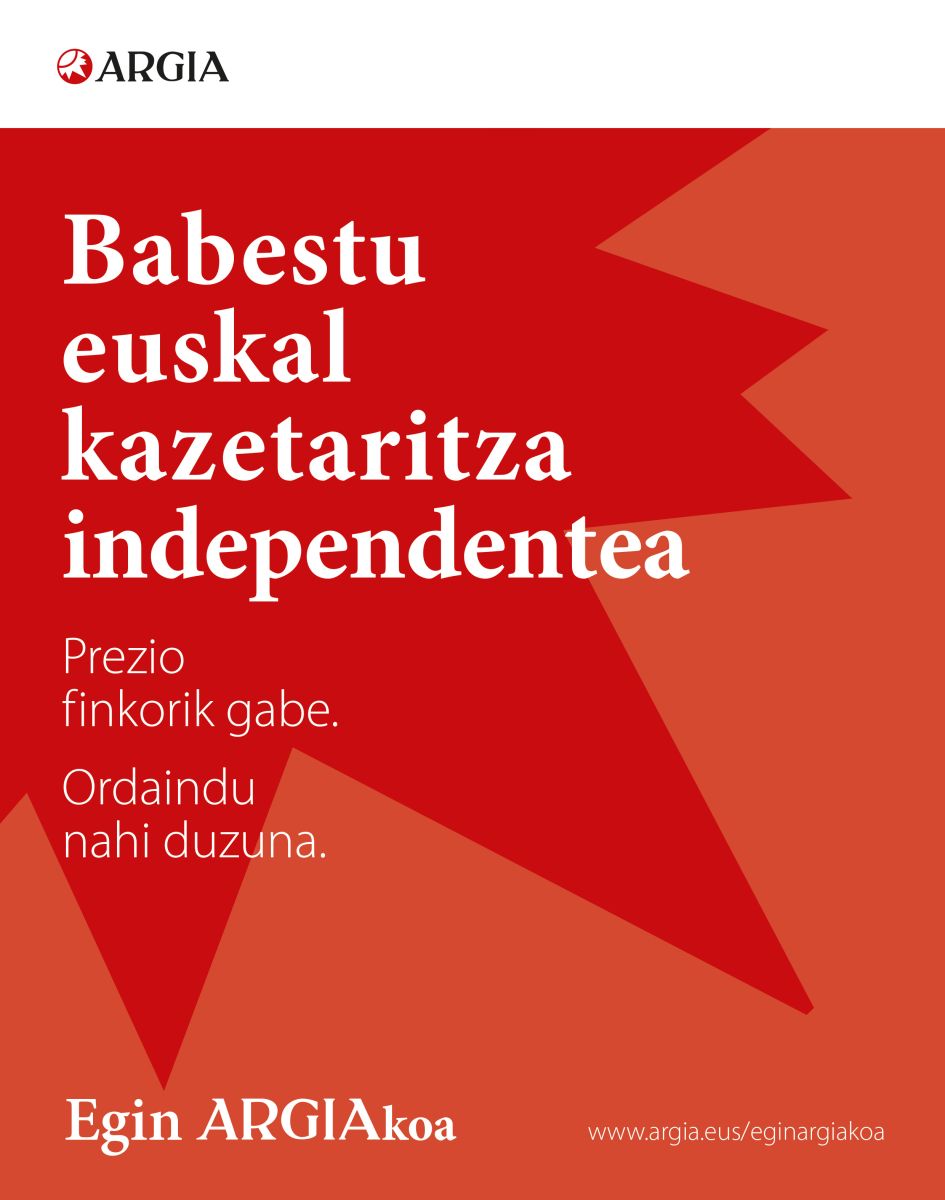
Unique subscription model
ARGIA is supported economically by around 5.000 subscriptions. In 2016, after two years of internal reflection, ARGIA changed the subscription model in order to adapt it to digital times. It was then that ARGIA decided not to set a prize for the subscription, but to let the people decide how much money they want to give. The concept is simple, but we have not found any other example of paper-based media letting the community decide how much want to pay (even if it's zero). Since the team removed the fixed prize (12 Euro per month for receiving the weekly magazine at home), people on average decide to pay more money than before. Now some people put 20 Euro per month and thanks to them, some other people that put 5 Euro or even less can receive the magazine. In this ways, some thousand-people’s community is organized to take care of each other. Thanks to the people who put more than the average, ARGIA can support "economically weaker" parts of the society by sending magazines for free and helping to fulfill their basic right to be informed. Thereby, hundreds of prisoners, hostelers who had to close their establishments due to the pandemic and people learning Basque in places where the language still is not officially recognized like the Northern Basque Country or South of Navarre are enabled to read for free ARGIA in paper.
In the last ten years, ARGIA has increased the subscriptions by 25 percent while almost all the paper-based media are losing them.

Public subsidy for lesser used language
The second important source of ARGIA’s income is a public subsidy for working in Basque language. What is this? Prohibitions to speak Basque language, punishments in schools, humiliations... are long documented. The Basque speakers have been attacked by the Spanish and French states’ politics during the last centuries and that is why Basque is a lesser used language –nobody abandons its mother tongue without suffering. In 1992 the Basque autonomous government passed a law to help revitalizing the language, through which they give a public subsidy to projects meeting certain requirements in the field of linguistic normalization. Being a media project completely in Basque language, ARGIA helps revitalize the language and is receiving an annual subsidy.
Advertisements
ARGIA’s advertisers (13% of the income) buy only advertising space to communicate their services and products: not a differential treatment of the newsroom. ARGIA’s advertisers are usually small businesses that respect the project. The different advertising formats are always conveniently identified.
When talking about public financing and journalism, the core fact that maintains the status quo in the field of media all around the globe are institutional advertisements. Here ARGIA is clearly punished by main Basque institutions comparing to all the other national media. Big Spanish media receive much more public money this way than Basque media in subsidies.
Diversification
Since the beginning of the 1980s, ARGIA urgently needed to create an intercooperational system with other independent companies related to its journalistic working process (like a printery, an informatics company or a company dedicated to make webpages and communication work) to survive. The reason: making journalism in Basque was not economically sustainable. Nowadays, we are four independent companies – all of them being created around the core project which is ARGIA. Together, we form the group called Ametzagaiña (in total more than 120 workers), which economically sustains and protects ARGIA.
Moreover, ARGIA also creates its own projects to earn money. The most successful ones are the books on gardening (in one year 10.000 books were sold), table games in Basque, the campaign No one is illegal together with the Senegalese street vendors' community of Bilbao, and the last Land Calling People-campaign with small farmers working the land through agroecology. These campaigns are very important for ARGIA.

ARGIA’s visions
We are able to make independent journalism because we are economically independent. Ownership is crucial. We are very happy to be sovereign, the reader will not find a bank, a corporation, or a political party behind our words. We are committed to our community and share all our information for free (CC-BY-SA) because we believe in the public function of journalism.
We see our values as working-fields for us. For example, four years ago, we removed the plastic bag we used to send the magazines. Instead, we use a bag made of biodegradable material and in that way we spare 200.000 plastic bags per year.
Another example is our delivery. Since 2022, hundreds of our magazines are delivered via bike-based delivery cooperatives in Bilbao, San Sebastian, Pamplona and Vitoria-Gasteiz. We support the alternatives to corporations like Glovo or Deliveroo who do not respect workers’ rights.
Technological sovereignty is another of our working lines. We impulse our own platforms and we have some 11.500 people receiving our everyday and weekly newsletters. We removed Google Analytics and social media tracking buttons from our website, which collect sensitive information about our community. We installed the free software Matomo tool instead of it and made a public campaign: Good bye Google, hello Matomo.
Finally, ARGIA’s main challenge is to continue increasing the number of subscriptions. For the tenth consecutive year, we continued to grow.
Where do we come from?
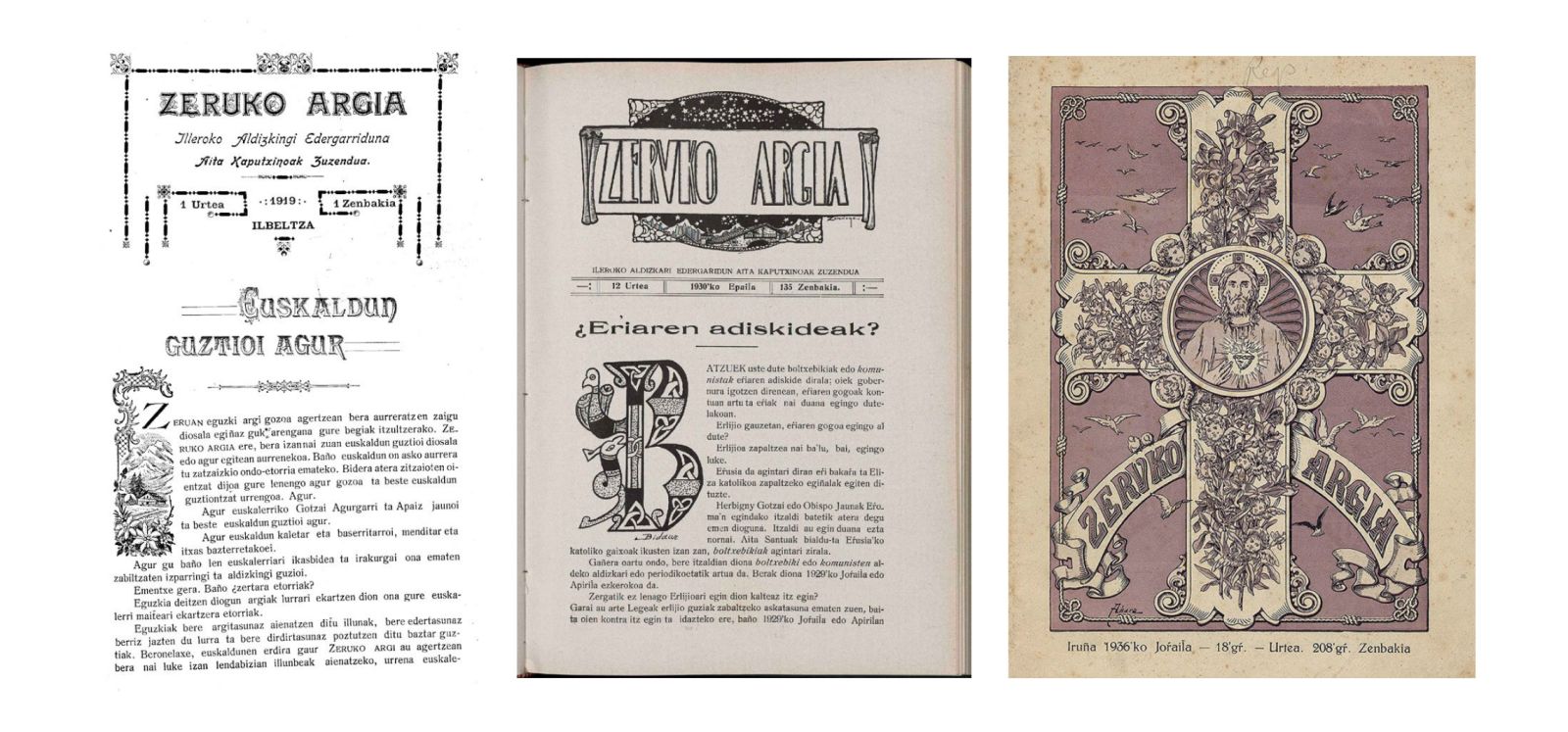
In 1919 some Capuchin priests created Zeruko Argia (“Light of heaven”) in Pamplona, a monthly religious magazine completely in Basque language. It worked until 1936, when the Spanish civil war began and, the next fascist dictatorship forbid publishing anything in Basque language. Between 1946 and 1948 fifteen numbers were published in Venezuela and New York. Clandestinely at first, and later, saying it was a religious publication, Zeruko Argia came back with their publications in the 1950's. Little by little they began making journalistic works between religious articles. It was the only media working in Basque and the matter it was “religious” helped go through censorship applied by the Spanish regime. Basque intellectuals joined the magazine and began writing in its pages.

In the 1960s, as the Basque political environment was turning turbulent and the separatist group ETA –acronym for Euskadi Ta Askatasuna meaning Basque Country and Freedom– began its armed fight against the Franco regime, Zeruko Argia changed gradually from being a religious publication to a socially-committed magazine while still being the only Basque-language publication in Basque Country. At the end of the 1970s, Zeruko Argia had become a combative magazine based in San Sebastian, always walking on the red line against censorship.
At the end of the 70's, in parallel with the Basque left pro-independence movement, Zeruko Argia had become a combative magazine based in San Sebastian. As example what Zeruko Argia had become, the front page below in the left prays: “fighters to the streets”, the second shows a tortured person in the front page and the third and fourth denounced police repression. The dictator Franco had died in 1975 and the regime was about to fall, and Zeruko Argia was always walking on the red line against censorship. The religious owners were not happy at all, they were losing money and decided to sell the magazine or close it down.
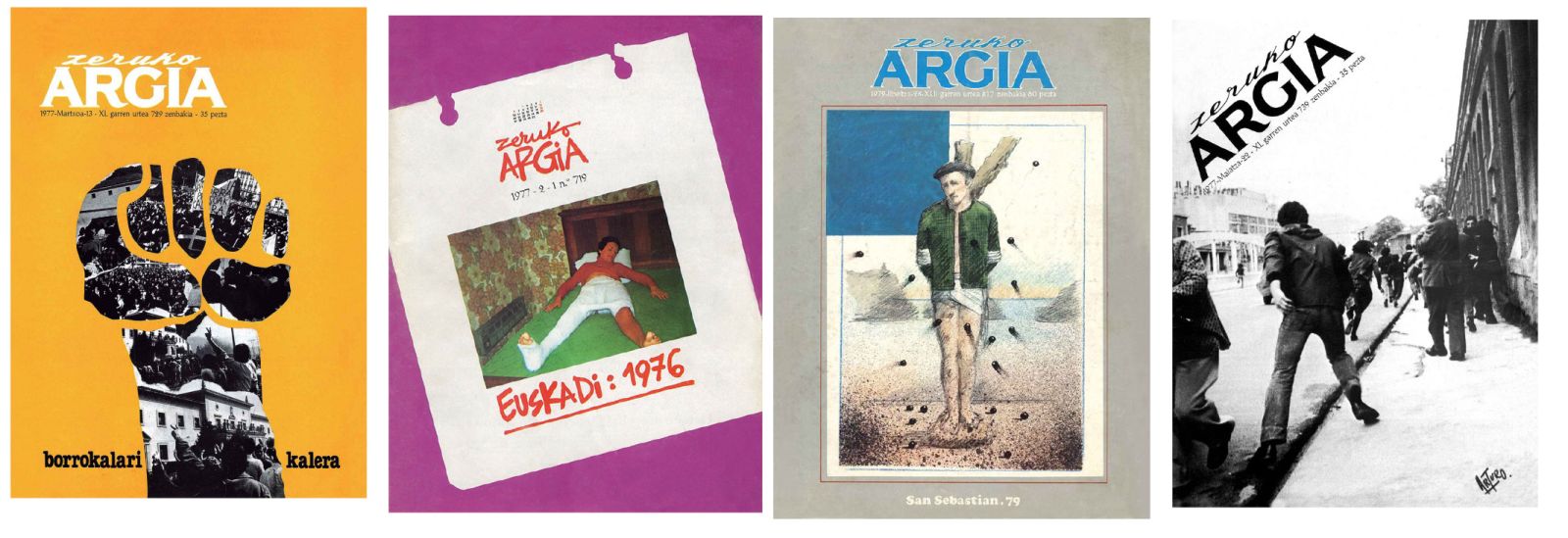
At that moment, some of the brave workers decided not to let the magazine disappear. Their main idea was that an oppressed language needs its own media which should not be bilingual. They risked all their personal belongings and bought the magazine and changed its name from Zeruko Argia ("light of heaven”) to Argia ("light” or "clear”). At first the project was heavily in debt but could be stabilized by militant work and by creating two other companies –printery and informatics– that would support the magazine technically.
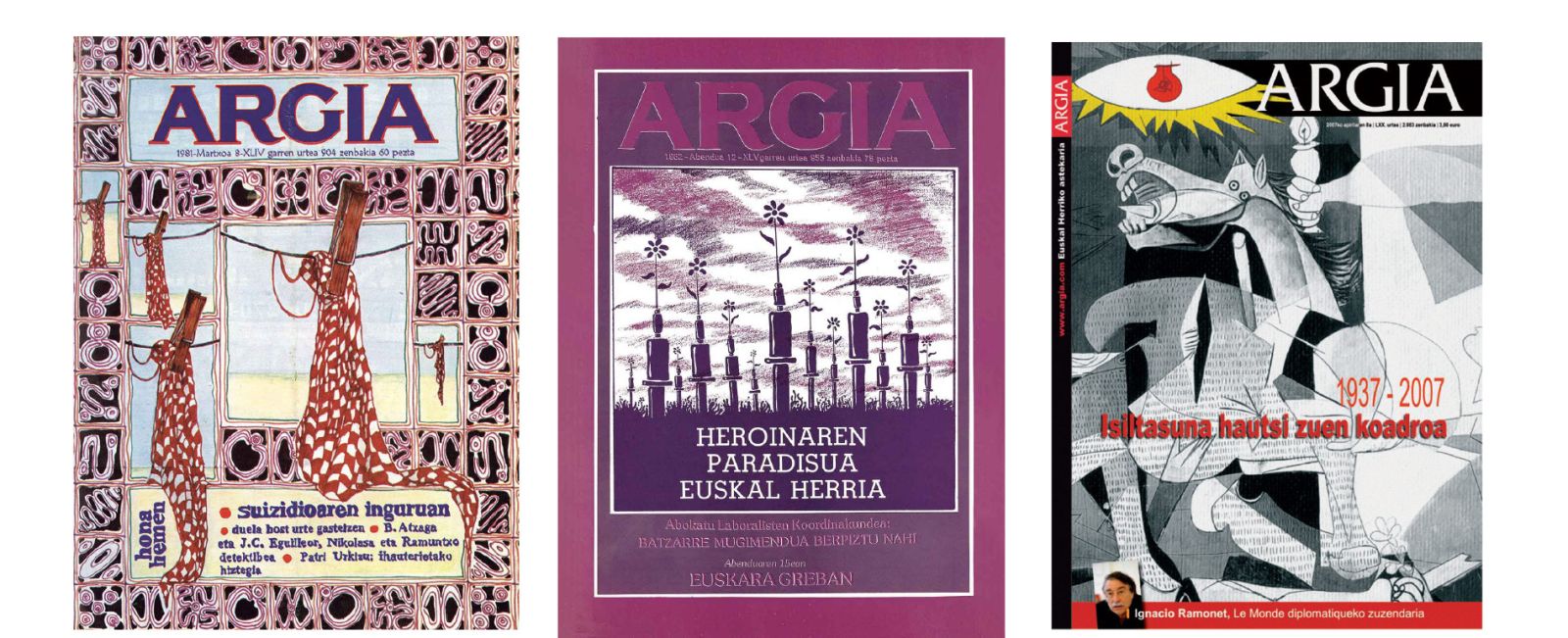
The team working at ARGIA in the 1980s built the economic pillars of the current project by creating a cooperational group around ARGIA. Their work also had an undisputed influence on the Basque journalistic landscape by helping to found a newspaper in Basque language: Euskaldunon Egunkaria, whose history, especially its end in 2003, exemplifies the oppressive power of the Spanish state.
On 20th February 2003, the black day for Basque journalism, the Spanish authorities closed down the newspaper Egunkaria due to invented allegations of an illegal association with ETA. The police tortured the members of the newspaper's executive board during detention –i. e. ARGIA’s journalist and first director of the newspaper Pello Zubiria had to be transferred three times to the hospital in Madrid during detention–. The workers, did not shut up and created a new newspaper for the next day: Egunero, and after three months of a huge crowdfunding, they created the newspaper Berria. After seven years, in 2010 the defendants were acquitted on all charges related to ties to ETA. In 2012, the European Court of Human Rights in Strasbourg condemned the Spanish State for not investigating torture allegations, in Martxelo Otamendi’s case, the last director of Egunkaria.
ARGIA continued its path as weekly magazine during the 80s, 90s, 2000s... with its ups and downs. For example, it was the first Basque media creating its own webpage and, always consciously, decided to put all the information for free there. ARGIA also was the first media in the Basque Country publishing multimedia videos on its webpage, long before many big Spanish media. After the economic crisis (2008) that hit Spain and the Basque Country hard, the magazine made a collective process of reflection on what kind of journalism the team wanted to do. Since then, ARGIA's journalism is considered more critical with the economic and political authorities. ARGIA was then the first media in the Spanish State which was punished with the infamous Gag Law for publishing a photo where a policeman could be seen making a detention. ARGIA decided not to pay the fine, went to court and won.

Here you can see all our magazines.





















